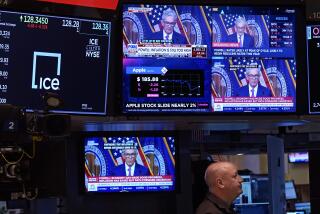Money Supply Up $4.6 Billion
- Share via
NEW YORK — The nation’s basic money supply surged $4.6 billion early this month, while broader money measures grew substantially in August, the Federal Reserve Board reported Thursday.
The narrowest measure, M1, rose to a seasonally adjusted average of $693 billion in the week ended Sept. 1 from $688.4 billion in the previous week, revised from the original estimate of $688.6 billion.
Besides cash in circulation, M1 includes other money to which people have ready access for spending, such as deposits in checking accounts and non-bank travelers checks. The central bank puts out information each week on M1, while reports on more comprehensive money tallies are released monthly.
The Fed’s news was not well received in American financial centers, which were still reeling from an earlier stampede of selling.
The frenzied selling occurred amid anxiety over the economy’s fragile health and fears of higher interest rates and inflation.
Faster Economic Growth
Some of the pessimism springs from speculation that accelerating U.S. economic growth might push up interest rates and inflation. Recent gains in the prices of some key commodities, including precious metals, have been seen as possible signs of a coming resurgence in inflation.
For the latest 13 weeks, M1 averaged $677.3 billion, a 17.7% seasonally adjusted annual rate of gain from the previous 13 weeks.
The Fed, in its attempt to provide enough money to stimulate non-inflationary economic growth, has said it would like to see M1 grow in a range of 3% to 8% from the fourth quarter of 1985 through the final quarter of 1986.
Reporting on its broader money measures, the Fed said M2 rose $23.4 billion in August to an average of $2.7 trillion, and M3 expanded to $3.4 trillion from $3.38 trillion.
M2 is made up of M1 and such accounts as savings deposits and money-market mutual funds. M3 is the sum of M2 plus less-liquid accounts such as certificates of deposit in minimum denominations of $100,000. The Fed is seeking 6% to 9% growth in both of these measures this year.
More to Read
Inside the business of entertainment
The Wide Shot brings you news, analysis and insights on everything from streaming wars to production — and what it all means for the future.
You may occasionally receive promotional content from the Los Angeles Times.










